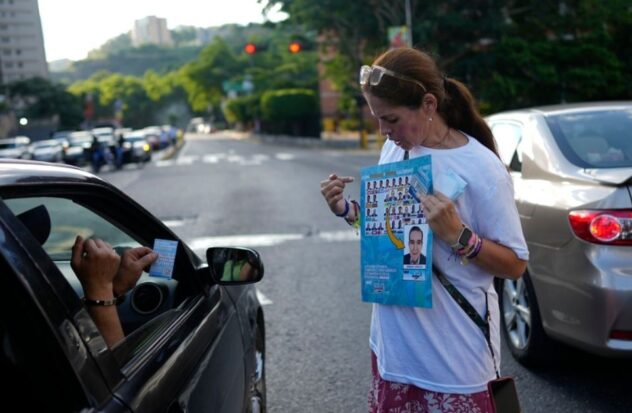Although he never got to defend a client in court, he agreed to try to defend something much bigger at the end of the month: the Venezuelan democracy.
Colmenares is one of thousands of supporters of the usually fractured Venezuelan opposition who accepted organize, mobilize and assist voters in the highly anticipated presidential elections on July 28.
The main opposition coalition is counting on its efforts, some led by parties and others formed spontaneously, to get people to the polls to vote and deter regime representatives from intimidating or coercing voters.
The lack of a truly independent electoral authority makes that job crucial to the alliance’s ability to verify or dispute the result. The coalition Democratic Unitary Platform (PUD) He hopes that the mere presence of many attentive voters at the polling stations will neutralize some of the government candidate’s strategies. United Socialist Party of Venezuela (PSUV) which in the past prevented them from having representatives within the polling stations, far from the counts and without a voice in case of irregularities.
The western city of Sabaneta, Barinas state, is the birthplace of Chavismo, the self-proclaimed socialist movement founded by the late president Hugo Chavez that has dominated Venezuela since the turn of the century. It’s also where Colmenares teamed up with nine other neighbors to encourage turnout and ensure opposition supporters get to their polling place. They’re prepared to organize transportation, provide support if they encounter PSUV checkpoints and hand out water or food if long lines form.
“However it is easier, whether through social media, calls, messages, or in person, the important thing is to do the work and talk to the community,” said Colmenares, a housewife with three children, after a meeting of a neighborhood group.
Different elections
The July 28 elections are unlike any the PSUV has faced since Chavez was elected president in 1998.
Now led by Chavez’s heir, Nicolas Maduro, the PSUV is more unpopular than ever among many votersLow oil prices, corruption and economic mismanagement by the Chavez regime have plunged the country into a crisis that has lasted for more than 11 years. Young people have had to give up their university aspirations, children are going hungry and millions of people have emigrated.
Economic sanctions imposed over the past decade did not topple Maduro, as the United States and other governments had hoped, but they contributed to Venezuela’s decline.
For years, opposition politicians boycotted elections they considered rigged, but this time they overcame deep differences to unite behind a single candidate. They also maintained their place on the ballot despite a constant crackdown by the regime, which vetoed Maria Corina Machado, the candidate who posed a bigger challenge to Maduro’s campaign for a third term.
Machado, who overwhelmingly won the coalition’s primary in October, is now backing the coalition’s replacement candidate, former diplomat Edmundo González Urrutia.
Pollsters estimate that up to 13 million people will vote on July 28.
The “commanditos”
The opposition estimates that more than half a million people have registered in an informal structure of neighborhood groups nicknamed “comanditos.”
The group’s members, who are by now familiar with the PSUV’s efforts to tip the balance in its favor during election time, are counting on gas stations not opening, opposition strongholds suffering blackouts, police and Maduro loyalists blocking roads and the military limiting access to polling stations.
Some groups hold raffles and sell hallacas (a typical Venezuelan dish) to raise funds to print promotional material for their neighborhoods and prepare food for opposition supporters. Others store gasoline at home and offer their cars or motorcycles to drive voters.
All have been instructed by the PUD to remain at polling stations after voting to reduce the fear of citizens and their polling station representatives, who are tasked with obtaining a copy of the voting records printed by electronic voting machines after the polls close. Regime loyalists, including armed gangs, are known to have intimidated polling station representatives, known as witnesses, into staying home or abandoning their duties before the end of voting day.
Electoral laws allow parties to have one witness for each voting station installed in each polling station.
“We have agreed as a committee that after the vote, we will monitor and guarantee the votes on July 28,” explained local organizer Fidel Ortega during a group meeting. “First, God, we will defend the right to vote for us as Venezuelans. On the 28th we vote, on the 29th we celebrate and from then on we all win,” he said.
Ortega estimates that opposition supporters have formed at least 40 neighborhood groups in the municipality that includes Sabaneta, a vast tropical grassland plain.
The government-controlled National Electoral Council (CNE) decided to use 36,000 voting machines. Many polling stations are widely spread out, making it harder for the opposition to monitor them all. About a third of voters in this election are assigned to polling stations with just one or two voting machines.
In the past, the PSUV has won most of its votes at these smaller polling stations, and for this election the CNE added 1,700 single-machine polling stations. Reports of the regime’s efforts to coerce and control the vote in pre-election elections have mostly been linked to these single- and double-machine polling stations.
Although thousands of people have signed up for neighbourhood groups, fear of reprisals if the details are leaked has prevented some opposition supporters from officially joining the mobilisation effort. But they are taking part anyway in groups of friends, family and colleagues with whom they plan to coordinate on 28 July.
“We have to go with the people so they lose their fear,” said Edgar Cuevas, a high school teacher who will be at the polls on election day. “Before, they would overshadow us with their groups and their things, but now that 10 groups are coming, well, there are 20 of us,” he said.
Source: With information from AP


